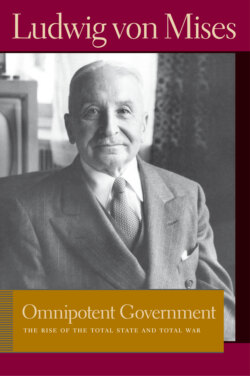Читать книгу Omnipotent Government - Людвиг фон Мизес - Страница 16
На сайте Литреса книга снята с продажи.
2. The Weakness of German Liberalism
ОглавлениеAt about the middle of the nineteenth century those Germans interested in political issues were united in their adherence to liberalism. Yet the German nation did not succeed in shaking off the yoke of absolutism and in establishing democracy and parliamentary government. What was the reason for this?
Let us first compare German conditions with those of Italy, which was in a similar situation. Italy, too, was liberal minded, but the Italian liberals were impotent. The Austrian Army was strong enough to defeat every revolutionary upheaval. A foreign army kept Italian liberalism in check; other foreign armies freed Italy from this control. At Solferino, at Königgrätz, and at the banks of the Marne the French, the Prussians, and the English fought the battles which rendered Italy independent of the Habsburgs.
Just as Italian liberalism was no match for the Austrian Army, so German liberalism was unable to cope with the armies of Austria and Prussia. The Austrian Army consisted mainly of non-German soldiers. The Prussian Army, of course, had mostly German-speaking men in its ranks; the Poles, the other Slavs, and the Lithuanians were a minority only. But a great number of these men speaking one of the German dialects were recruited from those strata of society which were not yet awakened to political interests. They came from the eastern provinces, from the eastern banks of the Elbe River. They were mostly illiterate, and unfamiliar with the mentality of the intellectuals and of the towns-folk. They had never heard anything about the new ideas; they had grown up in the habit of obeying the Junker, who exercised executive and judicial power in their village, to whom they owed imposts and corvée (unpaid statute labor), and whom the law considered as their legitimate overlord. These virtual serfs were not capable of disobeying an order to fire upon the people. The Supreme War Lord of the Prussian Army could trust them. These men, and the Poles, formed the detachments which defeated the Prussian Revolution in 1848.
Such were the conditions which prevented the German liberals from suiting their actions to their word. They were forced to wait until the progress of prosperity and education could bring these backward people into the ranks of liberalism. Then, they were convinced, the victory of liberalism was bound to come. Time worked for it. But, alas, events belied these expectations. It was the fate of Germany that before this triumph of liberalism could be achieved liberalism and liberal ideas were overthrown—not only in Germany but everywhere—by other ideas, which again penetrated into Germany from the West. German liberalism had not yet fulfilled its task when it was defeated by etatism, nationalism, and socialism.
